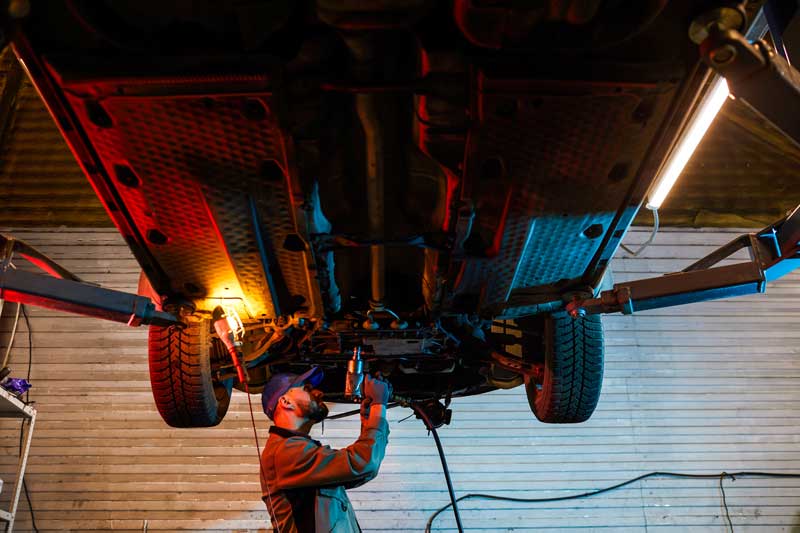Powertrain Warranty: What is it?
Some of the links on this page may link to our affiliates. Learn more about our affiliate policies.
Last Updated: December 17, 2022
The Powertrain warranty can be your first choice when finding reliable extended warranty coverage for your vehicle. However, many people wonder what a powertrain warranty is and what you should invest in. This extended warranty covers the components and systems responsible for moving your car.
The powertrain system provides power to the vehicles. When you buy a new car, you get a powertrain warranty from the manufacturer that typically lasts 60,000 miles or five years. This car warranty protects your car's engine, drivetrain, and transmission against damages or defects. Once your car's original powertrain warranty expires, you can prolong it by purchasing an extended car warranty.
To completely understand what a powertrain warranty covers and does not, you need to familiarize yourself with it and how it differs from other extended warranties. In this article, we'll uncover everything you need to know about powertrain warranty.
Difference Between a Car Warranty and Insurance
Car warranties are entirely different from insurance. A car warranty is a promise manufacturers make to ensure that their products will retain their formal condition for a specific period. The warranty of a car only lasts for a while; it usually lasts between 5 years/60,000 miles or three years/36,000 miles.
In contrast, car insurance covers vehicles from accidents and other general damages. Unlike insurance, a car warranty can come in different forms. The powertrain is one of the most significant types of car warranties that cover the costlier parts of your vehicle. A powertrain warranty can save you thousands of precious dollars by protecting your car's engine and transmission system.
What is Powertrain Warranty: Everything You Need to Know
The term "powertrain" refers to the essential parts of your vehicle, such as the engine and transmission that transmit and moderate power from your car's engine to its wheels. The components that make your vehicle's powertrain are typically the most crucial and expensive ones.
Even minor damage to these components can end up costing thousands of dollars. For example, replacing the transmission on a 2018 Honda Civic can cost about $6,000. A reliable powertrain warranty can be an ideal choice to have peace of mind and avoid financial burdens as your car ages.
Powertrain Warranty Vs. Bumper-to-Bumper Warranty
Your car's original warranty often includes separate bumper-to-bumper and powertrain warranties. The powertrain warranty covers expensive parts like the engine, drivetrain, and transmission. In contracts, bumper-to-bumper warranty included more comprehensive coverage. For example, it typically covers all the major components of your car's bumpers.
Although the powertrain warranty covers fewer components than bumper-to-bumper coverage, it lasts for a more extended period. Auto brands offer bumper-to-bumper warranty coverage for three years of 36,000 miles. Only a few manufacturers term up to 5 years or 60,000 miles.
Bumper-to-bumper warranty plans are considered more comprehensive than powertrain coverage, but they still have the following exclusions:
- Fabrics and seating
- Tire tread and tire support
- Brake pads
- Window glass
- Interior trim
Drivetrain Warranty Vs. Powertrain Warranty
Unlike a powertrain that covers all the major components of your car's powertrain, drivetrain warranties only cover the drivetrain. The drivetrain warranty providers only take responsibility for your vehicle's parts that provide power to the driving wheels, such as:
- Spool
- Differential
- Rear-axle
- U-joint
- Propeller shaft
- Torque converter
Powertrain Warranty Coverage
The powertrain warranty does not cover every part of the vehicle. It only provides coverage for significant parts of your vehicle's powertrain system. The main components of a car's powertrain include:
Differentials
Differentials help your car turn quickly. They use rotational movement from the longitudinal axis of your vehicle and convert it into the rotational movement on the car's latitudinal axis. Differentials use gears that mesh together and turn your car's wheels.
If your vehicle has a built-in differential into the transmission, perform its necessary maintenance. But if it is external, you need to change its fluid regularly according to your car's preventative maintenance schedule. If you don't maintain your car's differential, you may void your powertrain warranty.
Engine
A car's engine is the heart of your powertrain car warranty puzzle. The engine burns fuel and air together to generate power and keep your vehicle moving. It consists of a whole engine block and some internal components. The main parts of the engine block include:
- Bolt-on components
- Sensors
- Hoses
Some internal components of the engine block may include:
- Oil pump
- Intake and exhaust valves
- Gears
- Crankshaft
- Pistons
Ensuring the regular maintenance of your car's engine and its components is vital for validating your powertrain warranty. Any physical damage, modifications, or lack of care can result in a rejected powertrain warranty claim.
Other engine related parts that can be covered: all internal joints, constant velocity, and universal joints, wheel bearings, intake manifolds, axle hubs, drive shafts, axle shafts, and differential housing
Transmission
Transmission is another critical component of your car covered under a powertrain warranty. A transmission gets its input from the crankshaft and adjusts it to shift gears seamlessly. It is also responsible for changing the directions from forward to reverse and vice versa.
Like the engine, all the internal parts of your car's transmission are covered under a powertrain warranty. Unlike differential and machine, transmission components don't require regular maintenance. But you must perform general maintenance on time to ensure your powertrain warranty remains valid and intact.
Examples of transmission components: transmission fluid lines, actuation sensors, clutches, central gearset, hydraulic lines, transfer case, torque converter, and transaxle
Drive Shaft
The Driveshaft is the costly component of your car covered under a powertrain warranty. This part transmits torque to your car's engine and keeps it moving.
Drive system components that are usually covered under drive system: belts, timing gears, flywheel, timing chains, fuel injection, oil/water pumps, compressor gaskets, pistons, cylinder heads, cylinder blocks, and engine mount.
Axles
Axles are the rods that pass through the center of a group of wheels. Most of the cars have two axles which are covered under a powertrain warranty.
Transfer Case
Transfer case delivers power to the wheels from the transmission to the rear axles via drive shafts. A powertrain warranty also provides coverage for this expensive car's components. Below we have given a handy table listing major parts covered by the powertrain warranty.
Parts that Powertrain Warranty does not cover
A powertrain warranty does not cover components beyond your car's transmission, engine, and drivetrain. The below-given table will show all the exclusions of a powertrain warranty.
| Engine Coverage Exclusion | Transmission Coverage Exclusion | Drive Systems Coverage Exclusions |
|---|---|---|
| Module programming | Transmission cooling lines | Electrical connectors related to the drive system |
| Control module | Hoses | Wiring |
| Entire pressurized fuel system | Radiator | Hoses |
| Starter motor | Sensors | Sensors |
| Coolant heater core | Wiring | Lines |
| Coolant hoses | Electrical connectors | Drive system cooling |
| Engine radiator | Pressure plate | Locking hubs |
| Connectors | Clutch | Drive wheel rear and front hub bearings |
| Wirings | Transmission control module | Wheel bearings |
| Sensors | Drive system control module |
Cost of a Powertrain Warranty
The powertrain warranty comes with brand-new cars and costs nothing. But once your car's original contract expires, you must purchase an extended warranty. The average cost of a powertrain warranty may cost up to $2,856 and adds from three to six years of coverage. You can break this amount into monthly payments with no interest financing.
To give you a clearer picture of what powertrain warranty costs, we have provided a handy table highlighting the prices of powertrain warranties of different companies.
| Warranty Company Name | Powertrain Warranty Plan | Terms Length | Monthly Payment | Total Cost |
|---|---|---|---|---|
| Protect My Car | Driveline | Four years/75,000 miles | $78.86 for 42 months | $3,312.12 |
| CarShield | Gold | Unlimited | $99.99 | $1199.88 per year |
| CARCHEX | Silver | Five years/7,5000 miles | $116.09 for 24 months | $2,786.16 |
| Endurance | Secure Plus | Five years/ 100,000 miles | $81.67 for 36 months | $2940.12 |
How Long Do Powertrain Car Warranties Last?
A typical powertrain car warranty lasts for 60,000 miles or five years. However, depending on your provider, the powertrain warranties may have longer or shorter terms. The following table will highlight some major auto brands' powertrain warranty lengths.
| Powertrain Warranty Company Name | Term Length |
|---|---|
| Fiat Warranty | Four years/50,000 miles |
| Hyundai | Ten years/100,000 miles |
| Lincoln | Six years/70,000 miles |
| Honda | Five years/60,000 miles |
| Jeep | Five years /60,000 miles |
Final Verdict: Is a powertrain Warranty Worth Your Investment?
Purchasing a powertrain warranty that fits your needs and budget can be worth your investment. You should consider a powertrain warranty only if you want basic coverage, like for your car's engine and transmission. If you wish full range, you can decide on some comprehensive warranty programs, such as bumper-to-bumper coverage.
Your car's powertrain may experience costlier repairs. Powertrain warranties can help you avoid the expensive repair bills associated with the vehicle's engine and transmission. Unlike bumper-to-bumper warranties, powertrain warranties may provide limited coverage but can remain active for longer. The term length of a typical powertrain warranty plan is 60,000 miles or five years, but this varies depending on the warranty provider you choose.
The Car Data Review Methodology
Our expert review team is committed to providing honest and objective information. Based on consumer data, we identified the following rating categories and did extensive research to determine the top extended auto warranty providers.
- Affordable: Many factors influence the cost of a service, making it difficult to compare prices between providers. Our secret shopper team analyzes different vehicles, mileages, and warranty plans to give you this rating.
- Coverage - Each consumer has different needs. Every car warranty company must offer a variety of coverage options. We consider the number of plans available, terms limits, exclusions, and additional benefits.
- Industry Standing: Our team considers Better Business Bureau (BBB), ratings, availability, years in business, and other factors when determining this score.
- Customer Services: Trusted extended car warranty companies provide a level of customer care. We consider customer reviews, BBB complaints, and responsiveness to customer service.

Steven Dillon
Author
Steven is the founder and product tested for The Car Data, that has extensive knowledge in automotive industry. While most of his free time he participates in typical "car guy" activities, his passion for cars, data analytics, and tech, always has his looking for the next cool tool, software, trend, etc. to share with his audience on The Car Data or on his Instagram.

© 2023 The Car Data. All rights reserved.
